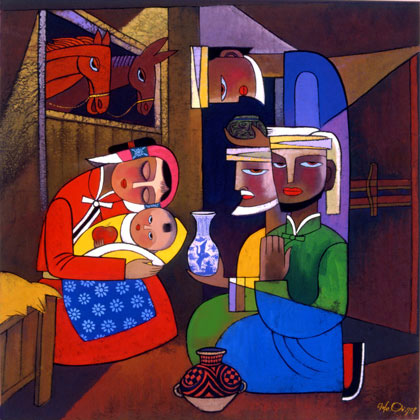After the twelve days of Christmas, Christians celebrate Epiphany on January 6. The word epiphany means “manifestation,” and on this day, we commemorate the Magi’s arrival and adoration of Jesus. It's the day that Christ was revealed to the Gentiles.
The Meaning of Epiphany
Epiphany is the culmination of our journey through the seasons: from the longing of Advent, to the jubilation of Christmas, and now a celebration of our unity in Christ.
Epiphany reminds us that the good news of the Gospel is for everyone – rich and poor, Jew and Gentile, slave and free, male and female – because we “are all one in Christ Jesus” (Gal. 3:28). As Peter told the crowd at Pentecost, “The promise is for you and your children and for all who are far off – for all whom the Lord our God will call” (Acts 2:39).
Epiphany is a time for showing hospitality — welcoming strangers — just as Jesus’s family did when the Magi appeared, unexpectedly, at their door. One of the traditional prayers for Epiphany says it beautifully: “Grace us with the hospitality to open our hearts and homes to visitors filled with unfamiliar wisdom bearing profound and unusual gifts.”
Epiphany reminds us that the good news of the Gospel is for everyone.
Celebrating Epiphany
Epiphany always falls on January 6, but since January 6 is often a weekday, many churches hold an Epiphany service on the Sunday falling between January 2 and January 8. For some years, this means Epiphany is celebrated during Christmas.
Epiphany traditions vary widely across denominations and cultures — a picture of the beautiful diversity of the church. Two traditions in particular have taken root.
Kings Cake
The traditional Kings Cake is a cake or pastry with a trinket or other object hidden inside, often a toy baby representing the infant Jesus. Searching for the trinket symbolizes the Magi’s search for the Christ child.
Host an Epiphany party, and have your guests bring dishes from all over the world. Top off the feast with a Kings Cake. The one who finds the trinket must host next year’s party.
Chalking the door
Another tradition involves marking the doorpost of the home with chalk and reciting a brief prayer. The traditional markings are a series of numbers, symbols and letters.
The numbers represent the year (in the photo above, 2016). The crosses symbolize Christ. The three letters have a double meaning. They're the initials for the traditional names of the Magi: Caspar, Melchior, and Balthasar. And they’re an acronym for a Latin blessing, Christus mansionem benedicat, which means, “May Christ bless this house.”

